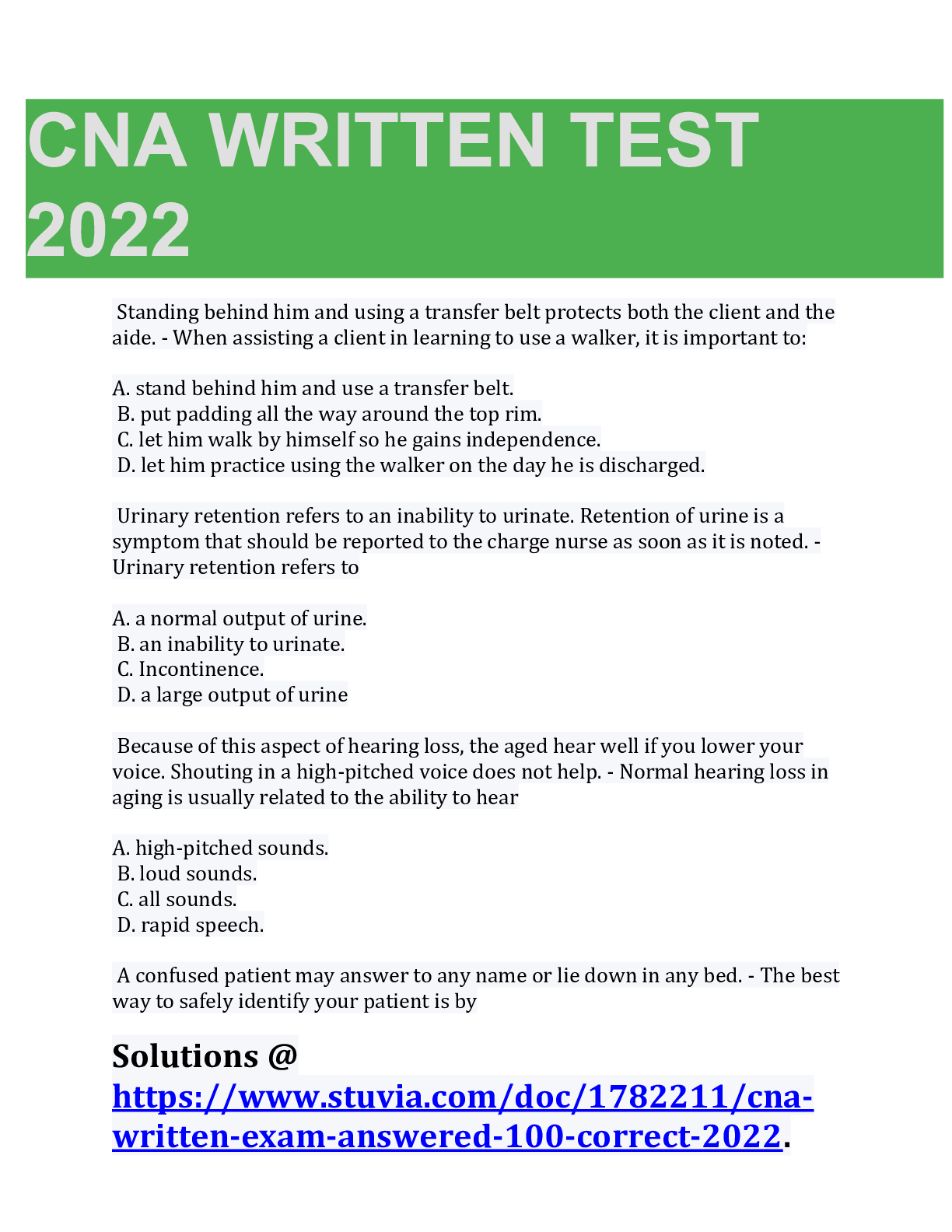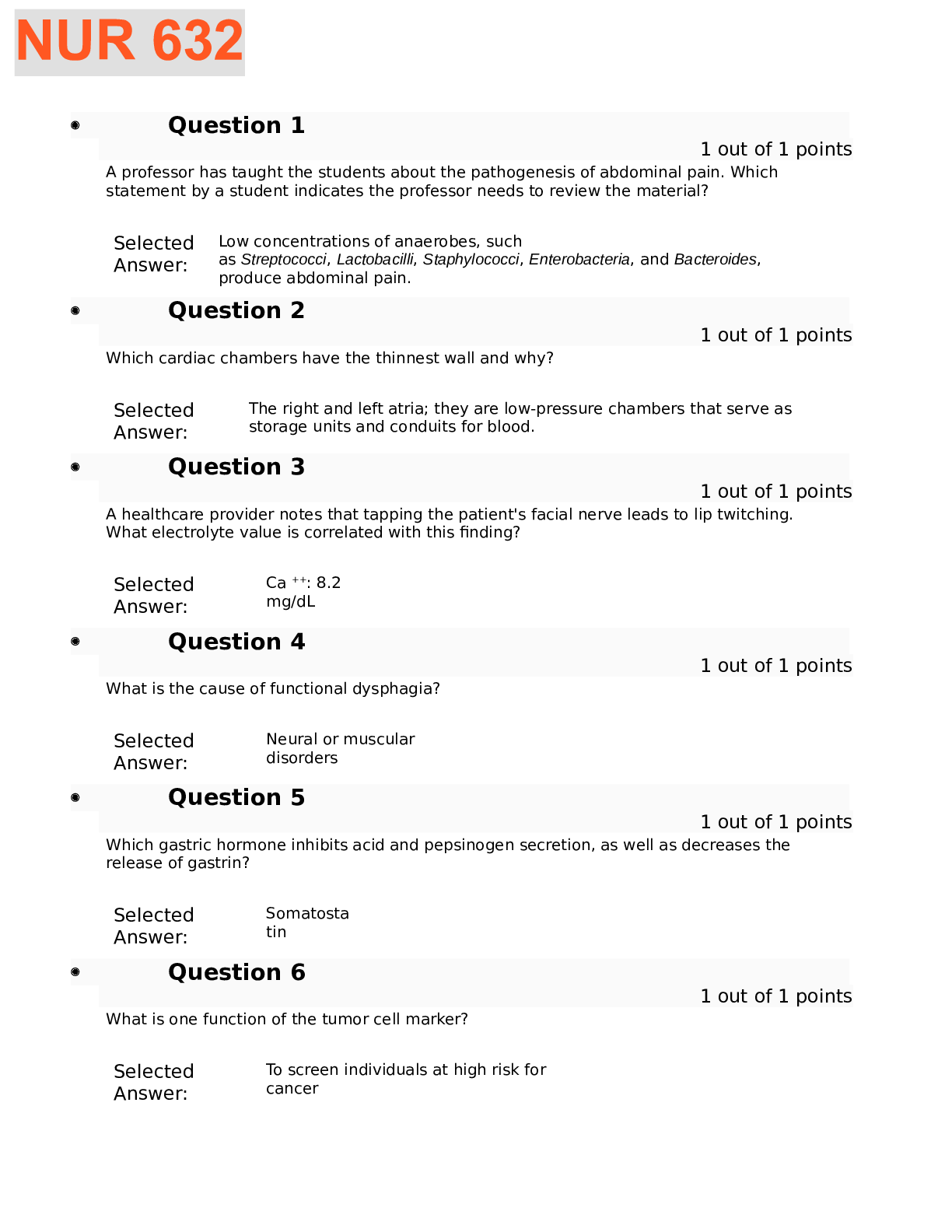*NURSING > QUESTIONS & ANSWERS > Chapter 11: NSG 201H Pain Management Test prep Questions and Answers,100% CORRECT (All)
Chapter 11: NSG 201H Pain Management Test prep Questions and Answers,100% CORRECT
Document Content and Description Below
1. Which action by the nurse is the most appropriate when initiating guided imagery with a patient as a method to control pain? 1) Suggesting a place where the patient will find peace 2) Guiding th... e patient toward a most beautiful or peaceful place 3) Asking the patient to use progressive muscle relaxation exercises 4) Asking the patient to take slow, full diaphragmatic/abdominal breaths ____ 2. A patient, who rates abdominal pain as a 10 on a 1 to 10 numeric scale is experiencing nausea, vomiting, and restlessness. Which conclusion is appropriate by the nurse based on the current data? 1) Acute pain 2) Chronic pain 3) End-of-life pain 4) Fibromyalgia pain ____ 3. The nurse is caring for a patient who is experiencing acute chest pain that is rated as a 9 on a 0 to 10 pain scale. Based on this data, which medication does the nurse plan to administer? 1) Morphine 2) Ibuprofen 3) Naproxen 4) Acetaminophen ____ 4. The nurse is teaching a class on the perception of pain. What will the nurse teach as being the second step in processing pain stimuli? 1) Thalamus 2) Limbic system 3) Cerebral cortex 4) Reticular system ____ 5. Which nursing action will provide the patient with the most pain relief after abdominal surgery? 1) Offer pain relief before the patient complains of pain. 2) Assess the pain level every 4 hours around the clock. 3) Wait until the patient can describe the pain specifically. 4) Allow the patient to “sleep off” the anesthesia, and then offer pain medication. ____ 6. The patient with a sprained ankle is complaining of pain in the injured area. Which term will the nurse use when documenting this patient’s pain? 1) Somatic pain 2) Visceral pain 3) Neuropathic pain 4) Physiological pain ____ 7. Which term should the nurse use to document the maximum amount of pain is able to tolerate? 1) Allodynia 2) Hyperalgesia 3) Pain tolerance 4) Pain threshold ____ 8. The nurse is using a nonpharmacologic method to manage a patient’s pain, and applies a unit that applies lowvoltage electrical stimulation directly over the pain area. When documenting this intervention, which term is the most appropriate for the nurse to use? 1) TENS unit 2) Nerve block 3) Functional restoration 4) Cutaneous stimulation ____ 9. The patient has pain in the lower back that radiates down the leg as the result of a herniated disk compressing the sciatic nerve that began 4 months ago. When documenting this patient’s pain, which term will the nurse use? 1) Acute somatic pain 2) Acute visceral pain 3) Acute neuropathic pain 4) Chronic neuropathic pain ____ 10. Which type of pain syndrome should the nurse assess when providing care to a female patient? 1) Back pain 2) Interstitial cystitis 3) Cluster headaches 4) Visceral pain from the heart ____ 11. The nurse is providing care to a postoperative patient who is getting out of bed for the first time since surgery. When conducting the pain assessment, the patient states, “It hurts, but I do not want to take any more drugs. I do not want to end up addicted.” Which response by the nurse is most appropriate? 1) “Don’t worry about getting addicted. I will make sure you don’t get addicted.” 2) “If you don’t take the pain medication on a regular schedule, you won’t get addicted.” 3) “People who have real pain are unlikely to become addicted to analgesics provided to treat the pain.” 4) “You are wise to be concerned; it is probably time to stop taking narcotics if you can manage the pain in other ways.” ____ 12. The nurse is providing care to a patient who had an abdominal nevus removed who is reporting intense pain. Which action by the nurse is appropriate? 1) Administer the stronger analgesic ordered by the primary care provider. 2) Administer a nonnarcotic analgesic because the patient had minor surgery. 3) Notify the health-care provider that the patient's pain is excessive for the minor surgery performed. 4) Attempt to divert the patient without administering an analgesic because the surgery was so minor. [Show More]
Last updated: 2 years ago
Preview 1 out of 18 pages
 (1).png)
Buy this document to get the full access instantly
Instant Download Access after purchase
Buy NowInstant download
We Accept:

Reviews( 0 )
$12.00
Can't find what you want? Try our AI powered Search
Document information
Connected school, study & course
About the document
Uploaded On
Sep 23, 2022
Number of pages
18
Written in
Additional information
This document has been written for:
Uploaded
Sep 23, 2022
Downloads
0
Views
47








.png)












